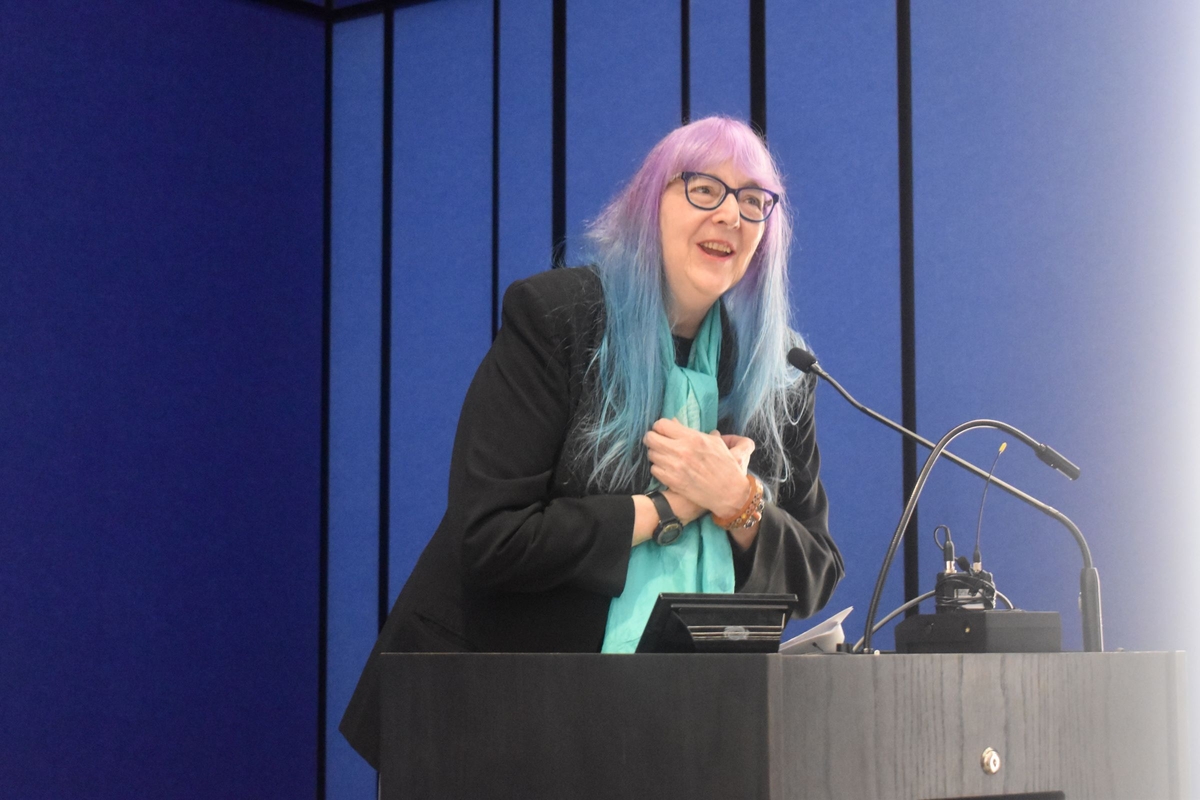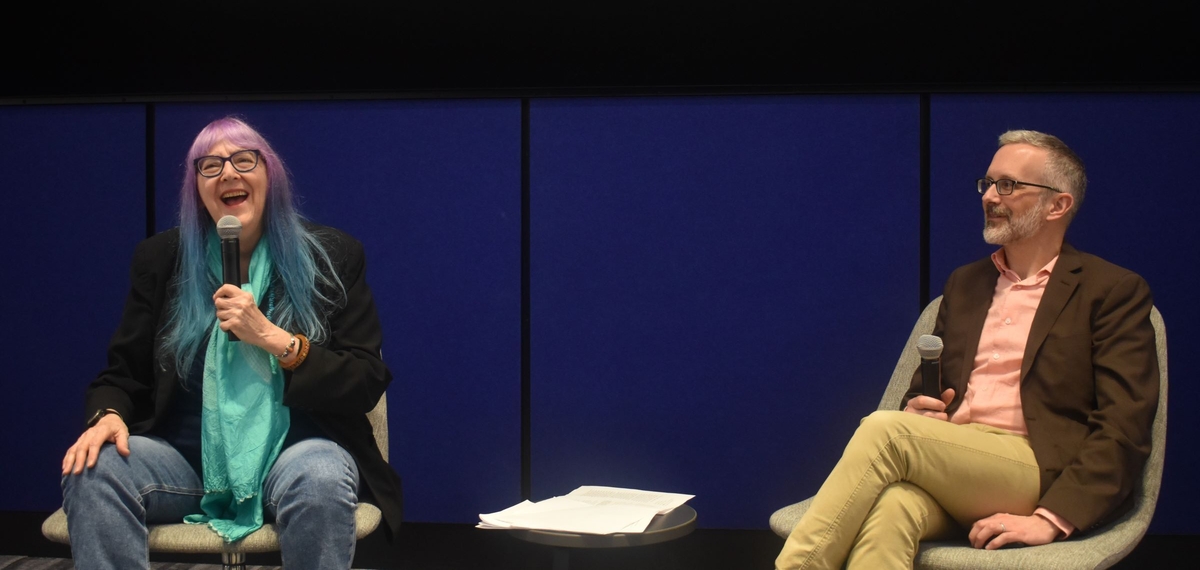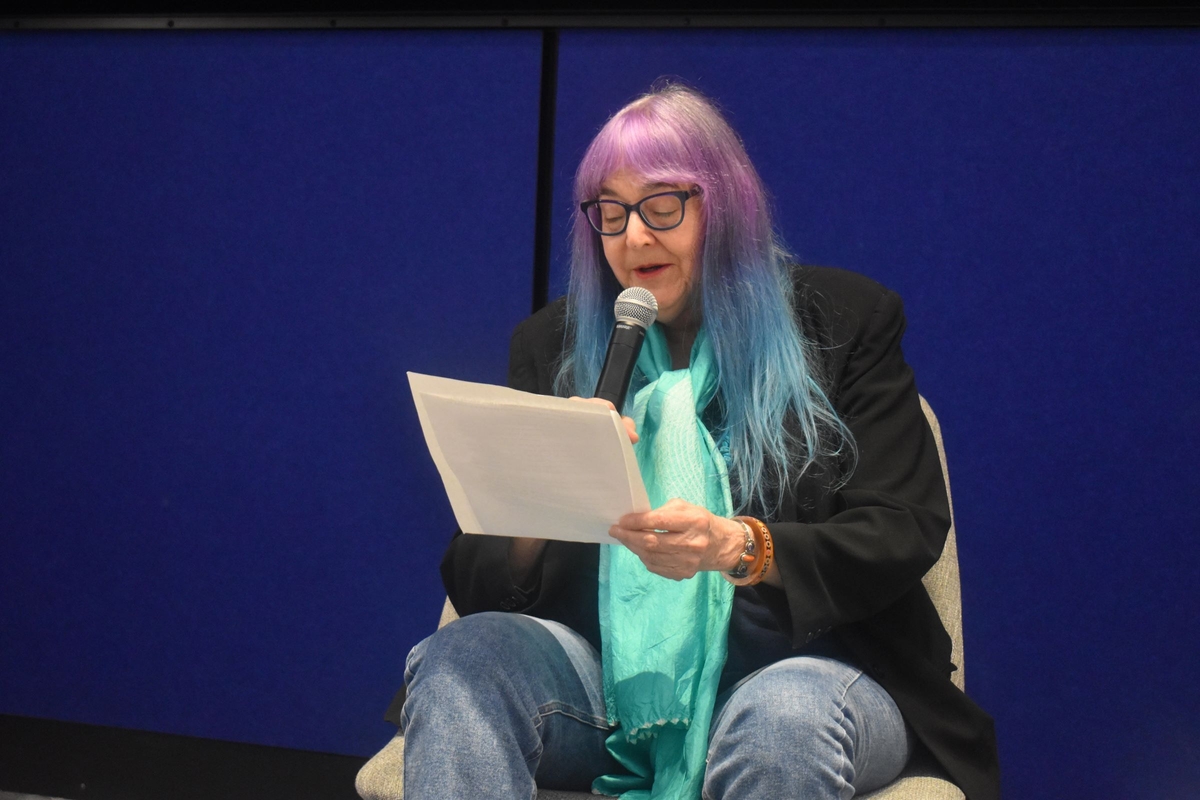
Karen Ponzio Photos
Alexis Krasilovsky.
Thursday night the Yale Film Archive added two new jewels to their Treasures series: a new 35 mm print of Daisies, the 1966 Czech New Wave film directed by Vera Chytilova, and a new 16 mm print of End of the Art World, the 1971 documentary made by Alexis Krasilovsky while she was a senior at Yale. Celebrated with a free screening at the Humanities Quadrangle, the event was made even more special by the presence of filmmaker and writer Krasilovsky, who introduced the films and participated in a Q&A afterward.
YFA’s managing archivist Brian Meacham welcomed the capacity crowd to “this wonderful premiere” noting that the two films had “a kinship and a shared mentality.”
Meacham went on to talk about how the prints were made. Krasilovsky’s original film negative had been lost, but she donated all the materials she had, which were then made into a new preservation negative from scanned original elements. He added that though the audio was restored, it was not 100 percent perfect.
“Let it wash over you,” he told the crowd with a smile.
The new print of Daisies was made by the Czech National Film Archive from the original camera negative, so it was “as close to the original as you can possibly get” and “could not be seen in a better way,” Meacham said. This new print was also laser subtitled, which means that the subtitles were etched into each frame.
Krasilovsky spoke of how Chytilova had inspired her, noting that she had graduated from Yale in 1971, with the first graduating class that included women.
She spoke of how many men wrote about “the end of the art world” in the years following her film. “Was it unfashionable to not give credit to a woman coming up with that idea in 1971?” she asked.
Krasilovsky’s film screened first, and cemented her as a visionary in blurring the line between the art and the artist. Her film captures such creative luminaries as Jasper Johns, Andy Warhol, Roy Lichtenstein, Robert Rauschenberg, and Jo Baer in conversation and sometimes in process. With a vibrant wit and youthful wisdom, she ends up creating a piece of art unto itself. Color and contrast permeate the 33-minute film that begs you to not look away, lest you miss a moment of the magic. You even get a sense of Krasilovsky the poet in the more rhythmic parts of the film, as when her camera dances its way through the Guggenheim and into the streets of New York City. In the end, it hearkens to a sense of revolution, in art and life.
Daisies screened next, a feast for the senses in any form, though it felt even more vibrant and impactive in its new print. The film follows the adventures of two women who go by different names to different men during the course of the film, but are referred to in the credits as Marie I and Marie II. What initially looks to be only irreverent and decadent takes on another life once you realize that this is a film of subversion — hinted at in the images of bombs being dropped as the film opens.
“If everything is going bad, we’re going bad,” Marie says to Marie. One then slaps the other from black and white into color, a field of flowers where they frolic, dance, and laugh. They go from man to man, indulging in large meals and wine. They go to a dance performance at a club and put on more of a show than what is happening on stage. Men want them and want to love them, but they want no part of it. And in the middle of all the excess and excitement comes such lines as “Can you smell it? How volatile life is?”
The ongoing commentary on life is interspersed between the feasting, the collaging, and other antics, with enough visual poetics and awe-inspiring aesthetics to keep any film fan satiated, even when the two Maries can’t seem to get enough. The film has a lot to say about the politics of its time — it was banned from theaters not long after its release — and leaves the viewer with much to chew on.

Krasilovsky and Meacham
Krasilovsky and Meacham sat down afterwards to discuss the film and take questions from the audience. Krasilovsky called Daisies one of her top ten films. She had watched it as a college student on a rainy night in London and “left the film totally identifying with her [Chytilova’s] vision and feeling like I should be a filmmaker.” Krasilovsky also “learned tenacity” from Chytilova, speaking about Chytilova’s influence over her other films, including Let Them Eat Cake.
When asked about how End of the Art World was the first film made by an undergraduate woman at Yale and what that experience was like, Krasilovsky chose to share an excerpt from her novel Portrait of an Artist as a Young Woman, which is a fictionalized version of her experience. That piece gave a glimpse inside her struggles, ending with one of two women saying maybe they would have to be secretaries instead of artists, and the other responding with “we are not going to be secretaries. We are going to practice the fine art of persistence.”

Krasilovsky reads an excerpt from her novel.
Audience members asked about her speaking to the artists in the film. Krasilovsky said she was more nervous about using the equipment than the interviews themselves, and shared anecdotes that included her joyous moments.
“I think I was winging it and having a great time,” she said. But she was “learning in the process” too, emphasizing that it was “a real struggle,” though she has had a lot of success over the years.
Meacham ended by saying “now I feel secure that your film will exist in perpetuity,” which drove home the importance of what YFA is doing with both its restorations and new prints. It is ensuring that films such as End of the Art World and Daisies, which document specific moments of cultural and historical significance, will not be lost in the current world, where some works available only digitally can be eliminated with a touch of a button. As viewers were reminded last night, there is still more to learn from such films, and from those who created them.
For more information about future screening events at YFA, please visit their website.